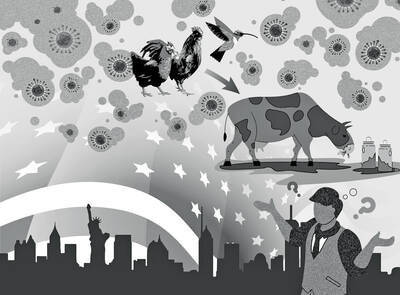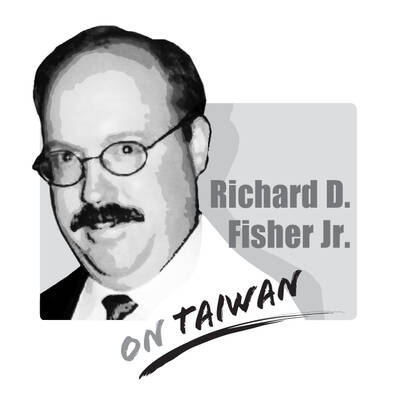On Tuesday, a 3m “Goddess of Democracy” statue was erected in Washington by the Victims of Communism Memorial Foundation in memory of the more than 100 million people who have died at the hands of the world’s various communist governments.
Taiwan, through the Taiwan Foundation for Democracy, donated US$1 million to the monument. In fact, Victims of Communism Memorial Foundation chairman Lee Edwards said that Taiwan was among the most generous donors.
But as Taiwan’s representative to Washington Joseph Wu (吳釗燮) correctly pointed out, the worth of the monument is its significance, not its cost.
To this day, Taiwan remains a victim of communism — or more specifically, a victim of the Chinese Communist Party. In addition to the military threat that China poses with its more than 900 missiles aimed at Taiwan, the nation is a frequent victim of Beijing’s saber-rattling and incessant attempts to prevent Taiwan’s participation in the international community.
Edwards said the Washington monument — dedicated on the 20th anniversary of then US president Ronald Reagan’s famous Berlin speech, during which he said, “Mr. Gorbachev, tear down this wall”— was created not only to remember the millions who have died, but also to educate people about the worldwide impact of communism.
From our perspective, it is hoped that the erection of the statue will in some small way help to open the eyes of the numerous members of the international community who appear to harbor illusions about communist China. For, in their eagerness to gain a share of China’s massive market, foreign governments are often far too willing to curry favor with Beijing at the expense of democratic Taipei.
Continual compromise and kowtowing to China by the free nations of the world are not going to make Beijing’s bullies open up their society and embrace democracy.
This strategy has proven to be a complete and utter failure. Surely the most obvious way of encouraging the spread of democracy would be to support those democratic countries which stand up to the threat of communism?
At a conference held earlier this month in Prague, Czech Republic, on the subject of “Democracy and Security,” US President George W. Bush held up Taiwan as an example for the world to follow. He went on to make an indirect reference to the Martial Law era of the then Chinese Nationalist Party (KMT) government, contrasting it with the democracy Taiwan presently enjoys.
Indeed, Taiwan’s successful democratization stands as both its crowning achievement and its best means of protection against the threat posed by communist China.
And so, regardless of their political affiliation, Taiwan’s future leaders must put democracy first — because it is the most important of the many things that separate this country from China, where one quarter of the world’s population is enslaved by a communist dictatorship.
A series of strong earthquakes in Hualien County not only caused severe damage in Taiwan, but also revealed that China’s power has permeated everywhere. A Taiwanese woman posted on the Internet that she found clips of the earthquake — which were recorded by the security camera in her home — on the Chinese social media platform Xiaohongshu. It is spine-chilling that the problem might be because the security camera was manufactured in China. China has widely collected information, infringed upon public privacy and raised information security threats through various social media platforms, as well as telecommunication and security equipment. Several former TikTok employees revealed

The bird flu outbreak at US dairy farms keeps finding alarming new ways to surprise scientists. Last week, the US Department of Agriculture (USDA) confirmed that H5N1 is spreading not just from birds to herds, but among cows. Meanwhile, media reports say that an unknown number of cows are asymptomatic. Although the risk to humans is still low, it is clear that far more work needs to be done to get a handle on the reach of the virus and how it is being transmitted. That would require the USDA and the Centers for Disease Control and Prevention (CDC) to get

For the incoming Administration of President-elect William Lai (賴清德), successfully deterring a Chinese Communist Party (CCP) attack or invasion of democratic Taiwan over his four-year term would be a clear victory. But it could also be a curse, because during those four years the CCP’s People’s Liberation Army (PLA) will grow far stronger. As such, increased vigilance in Washington and Taipei will be needed to ensure that already multiplying CCP threat trends don’t overwhelm Taiwan, the United States, and their democratic allies. One CCP attempt to overwhelm was announced on April 19, 2024, namely that the PLA had erred in combining major missions
On April 11, Japanese Prime Minister Fumio Kishida delivered a speech at a joint meeting of the US Congress in Washington, in which he said that “China’s current external stance and military actions present an unprecedented and the greatest strategic challenge … to the peace and stability of the international community.” Kishida emphasized Japan’s role as “the US’ closest ally.” “The international order that the US worked for generations to build is facing new challenges,” Kishida said. “I understand it is a heavy burden to carry such hopes on your shoulders,” he said. “Japan is already standing shoulder to shoulder